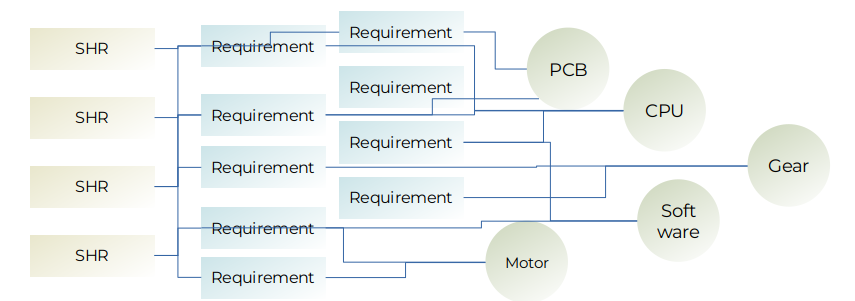Feature-Based Requirements Engineering (FBRE): Structured Complexity Management from the Start
In the demanding context of industrial product development, mastering complexity is a key success factor. FBRE provides a practical and effective approach by systematically structuring requirements through features — enabling clarity, traceability, and modularity early in the development process.

The Top Challenge: Complexity
Complexity is an inherent part of product development. It often arises from unclear requirements, communication gaps, bloated project scopes, and entangled dependencies.
And it’s growing steadily — particularly affecting historically grown portfolios.
Such factors hinder innovation, complicate collaboration, and significantly increase medium- and long-term costs.
Feature Based Requirements Engineering
FBRE represents a paradigm shift in product development: at its core is the modularization of features or functional components, which serve as fundamental building blocks for organizing requirements. Unlike traditional approaches that focus on the entire system, FBRE drastically reduces complexity by concentrating on modular units — features that abstract, structure, and make requirements more tangible.

Advantages of FBRE
Modularization enables Features to become independent modules, enhancing manageability
Early planning and structuring at the feature level creates a clear roadmap right from the start — especially during the critical initial project phase.
Reusability reduces redundancies across different products, families, and portfolios.
Improved Communication enhances clear definitions of features for communication, aligning stakeholders and development teams.
Early Application of FBRE from the project's initiation offers benefits
-
Preventing Scope Creep through early modularization enables a more accurate assessment of project scope, minimizing uncontrolled scope creep.
Efficient Resource Allocation when the entire project is structured around modular features.
Quick Adaptation to Changes without disrupting the entire development process as a result from the modular structure
Enhanced Collaboration between cross-functional teams, promoting a shared understanding
FBRE in Sustainable Product Development
In the context of sustainable product development, FBRE aligns seamlessly with broader goals:
The early application of Feature-Based Product Engineering is a pragmatic approach to address complexity in corporate product development. It offers a clear, modular, and foresighted path, aligning seamlessly with sustainability goals.